Career Development
British Surgeon Describes Lessons Learned from Trainee Duty Hour Limits
Lord Ribeiro gave his presentation at COSM 2011.
Lord Ribeiro gave his presentation at COSM 2011.
Dr. Johnson gave the presentation at COSM 2011.
Dr. Harold Pillsbury gave his presentation at COSM 2011.
Dr. Gerald Berke gave his presentation at COSM 2011.
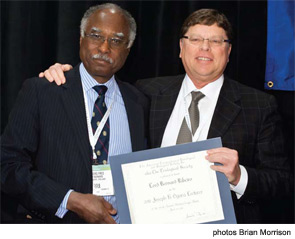
New limits on doctors in training in the United Kingdom (U.K.) have drastically reduced the amount of training they receive and may put patients in peril, a renowned retired British surgeon told listeners here on April 29 at the Annual Meeting of the Triological Society, held as part of the Combined Otolaryngology Spring Meetings.

Chemoradiation therapy (CRT) for head and neck cancer is overused at some centers in patients with early-stage laryngeal cancer, and more care should be taken not to overtreat patients with therapy that can have toxic effects, said invited lecturer Jonas Johnson, MD, at the Annual Meeting of the Triological Society, held here on April 29 as part of the Combined Otolaryngology Spring Meetings.
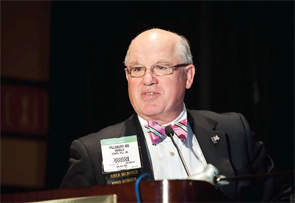
Harold Pillsbury, MD, chair of otolaryngology-head and neck surgery at the University of North Carolina School of Medicine in Chapel Hill, is known as one of the more colorful figures in his field, with a bright smile—usually accompanied by a bow tie—and a forthright demeanor.

Triological Society President Gerald Berke, MD, turned to the words of science greats in his President’s Address, delivering an inspirational talk on scientific research at the society’s Annual Meeting, held here on April 29 as part of the Combined Otolaryngology Spring Meetings.
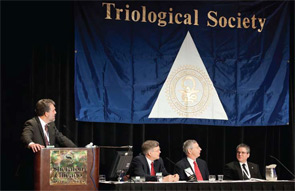
A 29-year-old banker with a mild upper respiratory infection that’s been lingering for a week arrives at the otolaryngologist’s office with tinnitus. He had flown six days earlier and lifted at the gym five days earlier.
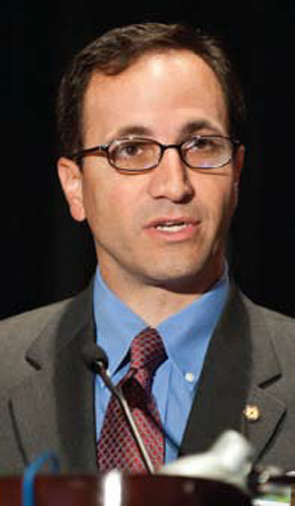
Quantitative real-time polymerase chain reaction (Q-PCR) can be a valuable tool in the operating room to determine whether head and neck cancer patients should go on to elective neck dissection, researchers said here on April 29 at the Annual Meeting of the Triological Society, held as part of the Combined Otolaryngology Spring Meetings.
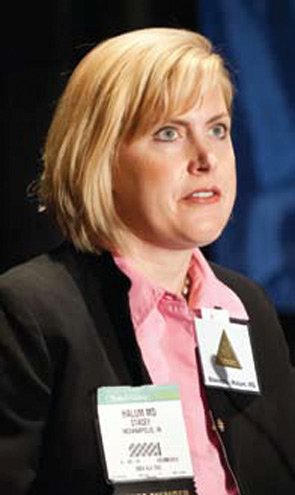
Neurotrophic factors can be introduced using stem cells and, along with the plant alkaloid vincristine, can be used to selectively reinnervate the larynx in rat models, a researcher from Indiana University said here on April 29 at the Annual Meeting of the Triological Society, held as part of the Combined Otolaryngology Spring Meetings.

Physicians have noted the potential for dizziness in migraine patients since the 19th century. And yet the 21st century has so far failed to bring any unifying definition to a symptom that is frustratingly diffuse in its intensity and frequency and unclear in its origins.

The idea of reusing single-use devices may bring to mind the recent news of a Las Vegas urologist who was investigated in March for supposedly resuing single-use devices. As the Las Vegas Review-Journal reports, Dr. Michael Kaplan is accussed of reusing, but not not decontaminating, endocavity needle guides. While Dr. Kaplan’s specific case may be unique, the idea of reprocessing single-use devices is not.
What are important parameters that should be considered in the treatment decisions for vestibular schwannomas? Background: The advent of stereotactic radiosurgery and its widespread use during the past decade have led […]
What are the patient variables associated with swallowing dysfunction in head and neck cancer (HNCa) patients prior to intervention? Background: Recent studies have shown that pretreatment deficits are common in HNCa […]
Is there evidence of extraesophageal reflux (EER) in idiopathic subglottic stenosis (iSGS)? Background: Although a subset is related to identifiable trauma, many stenoses in the upper airway are deemed idiopathic. Theories […]
Can drug-induced sleep endoscopy (DISE) help determine the mechanisms for lack of response to surgery for obstructive sleep apnea (OSA)? Background: The most common OSA surgical treatment in the U.S. is […]